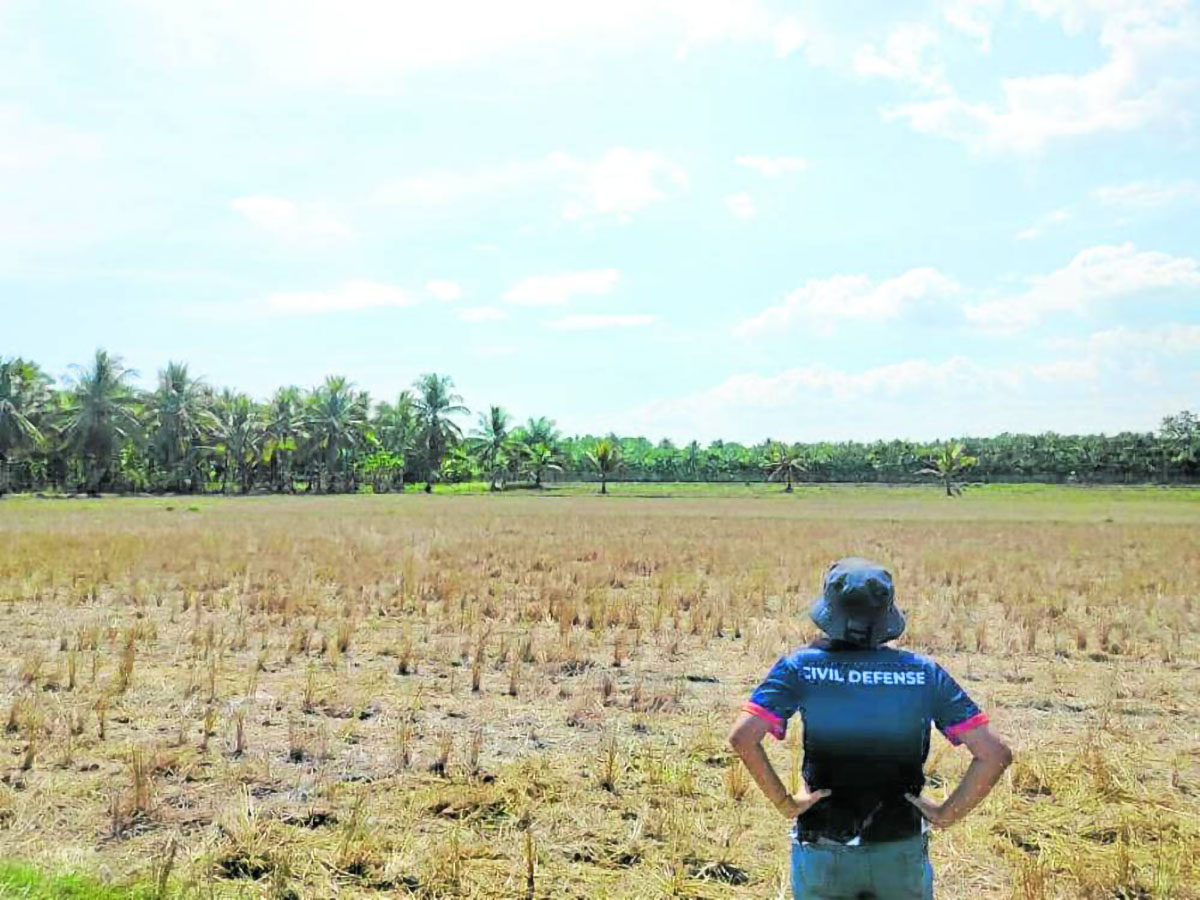
WITHERED Rice fields in the Special Geographic Area of the Bangsamoro Autonomous Region in Muslim Mindanao (BARMM) are withered amid the absence of heavy rain in the region due to the El Niño weather phenomenon. PHOTO COURTESY OF OFFICE OF CIVIL DEFENSE-BARMM
COTABATO CITY, BARMM, Philippines — The Bangsamoro Autonomous Region in Muslim Mindanao (BARMM) has been placed under a state of calamity due to the impact of the prolonged El Niño weather phenomenon that resulted in agricultural losses worth at least P1.4 billion.
Bangsamoro Interim Chief Minister Ahod “Al Haj Murad” Ebrahim declared the region under a state of calamity through Proclamation No. 002, following the recommendation of the area’s disaster risk reduction and management council.
READ: El Niño sends 131 areas into state of calamity
Data from the BARMM’s Ministry of Agriculture, Fisheries and Agrarian Reform showed that the livelihood of at least 26,112 farmers, tilling a total of 26,605 hectares of land, had been disrupted by the dry spell and drought brought about by El Niño.
Ebrahim said they expected the agricultural losses and the number of affected farmers and fisherfolk to rise once the assessment reports being conducted by different regional government offices had been consolidated.
“The declaration of state of calamity will provide [enough funds to] augment the ongoing response operations and recovery efforts that the Bangsamoro government has been extending to the affected communities,” Ebrahim said in the proclamation dated April 29.
He said the declaration would effectively control the prices of basic goods and commodities in the affected areas and give BARMM and its local governments the discretion to appropriate funds for rescue, recovery, relief and rehabilitation efforts.
The provinces of Basilan and Maguindanao del Sur and 15 of their towns earlier declared their respective areas under a state of calamity. Also covered by the declaration were 63 villages under the Special Geographic Area in Bangsamoro.
BARMM straddles the provinces of Maguindanao, Lanao del Sur, Sulu and Tawi-Tawi, and the cities of Cotabato, Marawi and Lamitan.
Irrigation project
Earlier, the provincial boards of South Cotabato and Sultan Kudarat in Soccsksargen (South Cotabato, Cotabato, Sultan Kudarat, Sarangani, and General Santos) region had also issued separate declarations placing their provinces under a state of calamity.
Meanwhile, thousands of farmers and their families in the provinces of Cotabato and Maguindanao del Sur are set to benefit from the P5.14-billion Malitubog-Maridagao Irrigation Project (MMIP) which started operation in Barangay Bagoinged in Pikit, Cotabato.
Earlier, President Ferdinand Marcos Jr. said the government had been prioritizing irrigation system projects as part of measures to address the impact of El Niño. The President, along with Cotabato Gov. Emmylou Taliño-Mendoza and other local officials, led the irrigation project’s inauguration on April 29.
The project sources water from the Maridagao River to irrigate 9,528 ha of agricultural land in the towns of Pikit, Aleosan and Pagalungan in Cotabato and Datu Montawal town in Maguindanao del Sur in the BARMM. It will benefit a total of 4,043 farmers in the four towns.
Marcos said he had directed the National Irrigation Administration (NIA) to prioritize irrigation systems, dams and all rain-catching projects in preparation for the drought after the Philippine Atmospheric, Geophysical and Astronomical Services Administration (Pagasa) released its forecast last November for a severe El Niño.
Cotabato, according to Taliño-Mendoza, is experiencing “dry condition” because of the El Niño.
“We are thankful that we are classified (by Pagasa) as experiencing dry conditions, not drought yet. In fact, it still rains here. As you see, there are no cracks in our soil. Hopefully, we can surpass this El Niño,” she told reporters.
Anthony Dinopol, one of the beneficiaries of the project, said the opening of the irrigation system would allow them to till their farmlands even under the prevailing dry conditions. He said this would assure their families that they would not go hungry.
Tanny Mandas, another beneficiary, said the irrigation facility would help farmers increase their production and profit. Based on the NIA’s projection, the MMIP is expected to help yield more than 110 caravans of palay per hectare. —WITH A REPORT FROM JUDY QUIROS